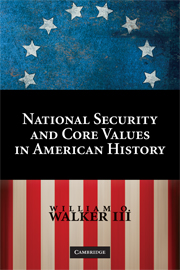Book contents
- Frontmatter
- Contents
- Preface and Acknowledgments
- Introduction: “A City upon a Hill”
- PART ONE THE ORIGINS OF THE SECURITY ETHOS, 1688–1919
- PART TWO INTERNATIONALISM AND CONTAINMENT, 1919–1973
- 3 The Postwar Era and American Values
- 4 The Construction of Global Containment
- 5 Civic Virtue in Richard Nixon's America
- PART THREE THE AGE OF STRATEGIC GLOBALISM, 1973–2001
- PART FOUR THE BUSH DOCTRINE
- Conclusion: The Security Ethos and Civic Virtue
- Select Bibliography
- Index
- References
3 - The Postwar Era and American Values
Published online by Cambridge University Press: 05 June 2012
- Frontmatter
- Contents
- Preface and Acknowledgments
- Introduction: “A City upon a Hill”
- PART ONE THE ORIGINS OF THE SECURITY ETHOS, 1688–1919
- PART TWO INTERNATIONALISM AND CONTAINMENT, 1919–1973
- 3 The Postwar Era and American Values
- 4 The Construction of Global Containment
- 5 Civic Virtue in Richard Nixon's America
- PART THREE THE AGE OF STRATEGIC GLOBALISM, 1973–2001
- PART FOUR THE BUSH DOCTRINE
- Conclusion: The Security Ethos and Civic Virtue
- Select Bibliography
- Index
- References
Summary
Tradition will not work in the complexities of modern life.
Walter Lippmann, 1914American capital will be the controlling factor in public and private finance.
William S. Culbertson, 1930By the end of the Great War, the military prowess and technological capability of U.S. armed forces had reached unprecedented heights. Showing the geographic sweep of the security ethos, U.S.-trained constabularies were trying to maintain order from the Caribbean and Central America to the Philippines. In addition, intervention in Mexico in futile pursuit of Pancho Villa in 1916–17 and subsequently against the Bolsheviks in Russia showed a willingness to deploy troops to far-flung regions of the globe in defense of national interests. Making the immediate postwar years different from the late nineteenth century was America's status as the world's foremost power, replacing Great Britain. Also evident was the weariness brought on by the human and material costs of the war. Mark Twain's cri de coeur denouncing war and empire, The War Prayer, which first appeared in 1916, evinced a greater understanding of the travail of war than did Roosevelt's fears about civilization and manhood absent the presumed glories of combat.
The treaty written at Versailles by Woodrow Wilson and the Allies did not necessarily hold the key to a better world; rather, it provided a hiatus of unspecified length during which the powers might try to build a foundation for a durable peace. In addition, the League of Nations did constitute a novel forum for addressing crucial international issues.
- Type
- Chapter
- Information
- National Security and Core Values in American History , pp. 75 - 101Publisher: Cambridge University PressPrint publication year: 2009



